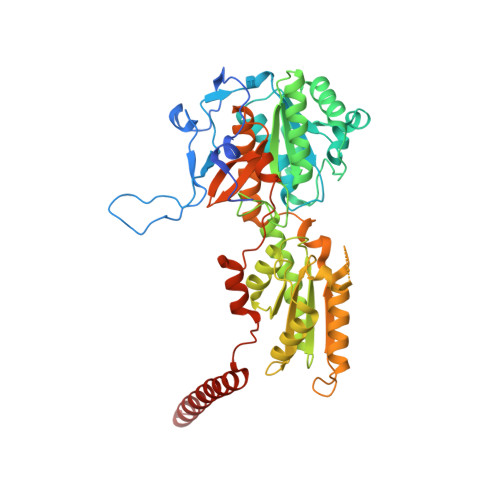Kinetic and structural studies of Trypanosoma and Leishmania phosphofructokinases show evolutionary divergence and identify AMP as a switch regulating glycolysis versus gluconeogenesis.
Fernandes, P.M., Kinkead, J., McNae, I.W., Vasquez-Valdivieso, M., Wear, M.A., Michels, P.A.M., Walkinshaw, M.D.(2020) FEBS J 287: 2847-2861
- PubMed: 31838765
- DOI: https://doi.org/10.1111/febs.15177
- Primary Citation of Related Structures:
6SY7 - PubMed Abstract:
Trypanosomatids possess glycosome organelles that contain much of the glycolytic machinery, including phosphofructokinase (PFK). We present kinetic and structural data for PFK from three human pathogenic trypanosomatids, illustrating intriguing differences that may reflect evolutionary adaptations to differing ecological niches. The activity of Leishmania PFK - to a much larger extent than Trypanosoma PFK - is reliant on AMP for activity regulation, with 1 mm AMP increasing the L. infantum PFK (LiPFK) kcat/K 0.5 F6P value by 10-fold, compared to only a 1.3- and 1.4-fold increase for T. cruzi and T. brucei PFK, respectively. We also show that Leishmania PFK melts at a significantly lower (> 15 °C) temperature than Trypanosoma PFKs and that addition of either AMP or ATP results in a marked stabilization of the protein. Sequence comparisons of Trypanosoma spp. and Leishmania spp. show that divergence of the two genera involved amino acid substitutions that occur in the enzyme's 'reaching arms' and 'embracing arms' that determine tetramer stability. The dramatic effects of AMP on Leishmania activity compared with the Trypanosoma PFKs may be explained by differences between the T-to-R equilibria for the two families, with the low-melting Leishmania PFK favouring the flexible inactive T-state in the absence of AMP. Sequence comparisons along with the enzymatic and structural data presented here also suggest there was a loss of AMP-dependent regulation in Trypanosoma species rather than gain of this characteristic in Leishmania species and that AMP acts as a key regulator in Leishmania governing the balance between glycolysis and gluconeogenesis.
Organizational Affiliation:
Centre for Translational and Chemical Biology, School of Biological Sciences, The University of Edinburgh, Edinburgh, UK.



















